#dynamic chord jam & join
Explore tagged Tumblr posts
Text
Unleash Your Inner Rock Star: Western Guitar Classes at Sarang's Creations

Unleash Your Inner Rock Star: Western Guitar Classes at Sarang's Creations
Calling all aspiring Rockstars, Blues aficionados, and Indie singer-songwriters in Patna!
SARANG'S CREATIONS offers electrifying Western guitar classes designed to turn your passion for popular music into proficiency. Whether you're a beginner strumming your first chords or a seasoned player wanting to shred like a pro, our program caters to all skill levels and musical aspirations.
Amplify Your Skills with:
Rockstar Instructors: Learn from our passionate and energetic instructors who are experts in various Western guitar styles, from Rock and Blues to Pop and Country.
Performance-Oriented Approach: Our curriculum emphasizes practical application, with a focus on developing essential techniques, learning popular songs, and building the confidence to perform.
Learn From the Legends: Dive deep into the music of iconic Western guitarists and bands, understanding their techniques and incorporating them into your own playing style.
Band Ensembles (Optional): Take your skills to the next level by joining our optional band ensembles. Jam with fellow musicians, experience the thrill of playing together, and prepare for live performances.
Electric Guitar Exploration: For those interested, delve into the electric guitar, learning about different pickups, effects pedals, and amps to create your unique sound.
SARANG'S CREATIONS offers:
Group Classes: Immerse yourself in a fun and interactive learning environment where you can learn from each other and build camaraderie.
Private Classes: Benefit from one-on-one attention for a focused and accelerated learning experience tailored to your specific goals.
Flexible Class Schedules: Find a class that perfectly fits your busy lifestyle.
Age-appropriate programs: We offer classes designed for teenagers and adults with a passion for Western music genres.
Turn Up the Volume on Your Musical Journey!
Register for your Western Guitar classes at SARANG'S CREATIONS today and start rocking!
We can further enhance your webpage with:
High-Energy Visuals: Include exciting images or videos of students engaged in Western guitar lessons, band practices, and live performances.
Genre Specifics: Showcase different Western guitar styles like Rock, Blues, Pop, and Country to cater to diverse musical interests.
Student Band Spotlight: Feature student bands formed at SARANG'S CREATIONS and their achievements.
Contact Information: Make it easy for potential students to reach out (phone number, email address, social media links).
By incorporating these elements, you can design a dynamic and engaging webpage that attracts aspiring Western guitarists in Patna and effectively communicates the energy and excitement of SARANG'S CREATIONS' program.
0 notes
Text
Greatest rock guitar duos
The world of rock music has been significantly shaped by the contributions of legendary guitar duos. These dynamic pairs have not only revolutionized the genre with their exceptional skills but also created timeless music that continues to inspire generations. This article delves into the greatest rock duo guitarists, exploring their unique styles, groundbreaking techniques, and the indelible impact they have left on the rock music landscape. By examining the synergy between these guitarists, we aim to understand how their collaborations have redefined the boundaries of rock music and solidified their places in music history.
Keith Richards & Brian Jones (The Rolling Stones): Keith Richards and Brian Jones were the driving force behind The Rolling Stones during their early years. Brian Jones, with his innovative slide guitar work, added a bluesy edge to the band’s sound. However, tensions arose, and Keith Richards eventually took over as the primary guitarist. Their dynamic chemistry shaped the Stones’ iconic hits, and even though Jones tragically passed away in 1969, their legacy endures .
Joe Perry & Brad Whitford (Aerosmith): Joe Perry and Brad Whitford formed a formidable guitar duo in Aerosmith. Perry’s fiery solos and Whitford’s rhythmic prowess blended seamlessly, creating the band’s signature sound. Their collaboration produced timeless hits like “Dream On,” “Walk This Way,” and “Sweet Emotion”.
Angus & Malcolm Young (AC/DC): Angus Young’s electrifying lead guitar work paired perfectly with Malcolm Young’s solid rhythm playing. Together, they defined AC/DC’s raw, high-energy rock sound. Malcolm’s songwriting and Angus’s iconic schoolboy persona made them an unforgettable duo.
James Hetfield & Kirk Hammett (Metallica): James Hetfield’s powerful rhythm guitar and Kirk Hammett’s melodic lead lines propelled Metallica to metal superstardom. Their synergy on tracks like “Enter Sandman,” “Master of Puppets,” and “One” solidified their place in rock history.
Dickey Betts & Duane Allman (The Allman Brothers Band): Dickey Betts and Duane Allman pioneered twin guitar harmonies, revolutionizing rock music. Their intricate interplay, showcased in songs like “Jessica” and “In Memory of Elizabeth Reed,” remains influential to this day.
Dickie Betts & Warren Haynes (The Allman Brothers Band): After Duane Allman’s tragic death, Dickie Betts continued to shine alongside Warren Haynes. Their soulful, blues-infused guitar work carried on the Allman Brothers’ legacy.
Slash & Izzy Stradlin (Guns N’ Roses): Slash’s iconic lead guitar solos and Izzy Stradlin’s gritty rhythm guitar defined Guns N’ Roses’ rebellious sound. Together, they rocked the world with hits like “Sweet Child o’ Mine” and “November Rain.”
Stone Gossard & Mike McCready (Pearl Jam): Stone Gossard’s textured chords and Mike McCready’s emotive solos shaped Pearl Jam’s grunge rock anthems. Their synergy elevated tracks like “Alive” and “Black.”Glenn Tipton & K.K. Downing (Judas Priest): Glenn Tipton and K.K. Downing forged the dual guitar attack that defined Judas Priest’s heavy metal sound.
10. Glenn Tipton & K.K. Downing (Judas Priest): Glenn Tipton and K.K. Downing forged the dual guitar attack that defined Judas Priest’s heavy metal sound. Their harmonized leads and aggressive riffs influenced countless metal bands.
11. Charlie Hargrett & Jay Johnson (Blackfoot) Charlie Hargrett was a pivotal guitarist in Blackfoot’s classic lineup. Alongside Rickey Medlocke, he contributed to the band’s signature Southern rock sound. Blackfoot embarked on a tour, and Jay Johnson joined as a guitarist and vocalist. Although not part of the classic lineup, Johnson brought his own flair to the band. His guitar work complemented the legacy left by Hargrett and Medlocke. Together, they kept the Blackfoot spirit alive.
12. Gary Rossington & Allen Collins (Lynard Skynard): When it comes to Lynyrd Skynyrd, the guitar duo that stands out prominently is Gary Rossington and Allen Collins. Let’s dive into their legendary partnership:
Gary Rossington:, As a founding member of Lynyrd Skynyrd, Gary Rossington played a pivotal role in shaping the band’s sound. His soulful and expressive guitar work contributed to hits like “Sweet Home Alabama,” “Simple Man,” and “Tuesday’s Gone” . Rossington’s slide guitar solos and melodic riffs became synonymous with the Lynyrd Skynyrd sound. His ability to blend rock, blues, and country elements created a unique sonic landscape.
Allen Collins: Allen Collins was another key guitarist in the band. His partnership with Rossington created a formidable guitar duo that defined Lynyrd Skynyrd’s dual-guitar sound. The intricate interplay between the two guitarists and their harmonized solos became a hallmark of the band’s live performances, captivating audiences with their dynamic and electrifying stage presence Collins co-wrote many of Lynyrd Skynyrd’s beloved hits, including “Free Bird,” “Sweet Home Alabama,” and “Tuesday’s Gone”.
These guitarists not only complemented each other but also elevated Lynyrd Skynyrd’s music to iconic status. Their legacy lives on, inspiring generations of rock enthusiasts.
#rock n roll#music#bands#live music#classic rock#indie rock#music lovers#guitar#drums#vocals#music video#album#rock music#band#band life#band management#music business#rock band history
0 notes
Text
The Heart of a Band: The Bass
Q&A with bassist Rob Rizk
Rob Rizk has always been surrounded by music. Classic rock vibrated through his household most days, molding Rizk's ears from a young age. Beginning his music journey with brass instruments, he took up a quick affinity for the deeper tones in music. This led Rizk to the bass guitar. As he became more and more dedicated to practicing, the basement of his childhood home became his music lab. With no formal lessons, Rizk quickly picked up technical skills as a bassist on his own. It wasn’t long before Rizk formed a band, in which he was able to both practice his versatility as a musician and hone his skills as a budding bassist. He credits many inspirations from the world of classic rock, funk, jam rock, blues, and indie rock.
Now a college freshman, just 4 years on from his first encounter with a bass, Rizk is flying high with a signature playing style curated from his experience imitating songs and improvising on his own to give his newly formed college band, ‘RedInk’ a solid yet dynamic foundation. With his ever-developing ear, Rizk commits his practice to achieve a crucial full sound within the rhythm section and the band as a whole. Rizk joins me, his bandmate and drummer, to discuss his process on the bass, playing inspirations, and personal experience as a musician.
Can you describe the instrument for people who may be unfamiliar?
Well, bass guitar, it's four strings. It's the four lowest strings of a guitar. So if you're familiar with the guitar and it's, uh, down a couple octaves. It's just like low tones and stuff, and it's just pretty funky.
When did you start playing bass?
I got my first bass for $80 off a friend in 2019, in June. It was actually kind of funny. I was playing. Like for a band, like a concert band. And then I was outside. He was like, do you have the money? I was like, yeah, I got it. And we just swapped and then I brought it home with me.
Have you ever taken any lessons for bass?
I just sat in my basement or in my room and just like YouTube and then figured it out. That's the way to do it. Um, like especially for, um, the musical. I have no idea how to read bass clef. It was very funny. My band teacher goes, you can,you can do this, right? And I’m like, yeah, knowing full well, I have no idea what I'm doing and I killed it. I learned in the process of like, oh, that's what that is.
What’s the biggest tip you could give to a beginner bassist?
I would say enjoy it as much as you can. Bass playing, if you learn it and you master it, it can be one of the most rewarding instruments you can play. It's overlooked. So you're kind of the underdog. The guitar player. Like, oh, they can do all these cool solos, but you never expect this bass player to come in and go, like, go hard on this instrument. And so like, oh god dang. So like stick, stick with it. And, uh, practice, practice, practice, practice makes perfect. I practice in my basement for hours and hours.
How would you explain your role as a bassist?
For me personally, bass guitar is like a blend of rhythm and blend of lead. Cause there's a lot of ways, there's a lot of places you can go with the bass as an instrument. Like you can just back up the drums and keep that steady rhythm going. But then you can go and solo and there's a lot of bass players who solo nowadays that are phenomenal.
Do you play any other instruments?
I started off with classical brass instruments. My first instrument pretty much was the trumpet. So I played the trumpet, and I played the French horn but then freshman year of high school is when I got into bass. After I started learning bass, I decided I really liked it. So I started playing guitar and I kind of, I can play the piano, I can do chords. When I first started I just liked learning songs that I like to play. A lot of queen songs I liked to play cuz I was a big queen fan in high school. And then, Uh, my first big band, like, well not big, not like touring and stuff like that, but it was this band called Shapes of Shades, and it was me and four other friends and we just played, we had two, or like one show, one major show. And we just played together, it was right around Covid. It was 2021, so it was a good excuse to get outta the house. Yeah but that band really didn't do much for me. I actually really didn't play bass for that. That's where I excelled at other instruments, I played guitar and piano and drums
For one of them. It was weird, but then I left that. I was in the pit for a musical at the high school and I did Mamma Mia, so I played bass for that. And a lot of Abba songs. That's pretty much it for high school. And then when I came here to Endicott, I joined a band(Redink). So we're, we're, we're grooving right now.
Do you have any more, do you have any instruments on your mind that you really wanna learn in the near future? Um, I want to get better at the drums cuz I really like the drums and drums and bass compliment each other in different ways. So like, once you understand drums, I mean vice versa. I mean, I could sing, but like, I'm not a great singer, so that would be cool to do. Like a Getty Lee. Getty Lee's amazing.
Do you have any role models that play bass?
There's a couple. I mean, I think my biggest inspiration right now, number one would probably be Paul McCartney, just cuz I like him. It's basic, but it gets the job done in a creative way. And I really like the Beatles, so I kind of have to include him. Sam Kiska of Greta Van Fleet, he rips the base up. He brought it to new places, like the rock and roll genre. John Paul Jones, also great, Led Zeppelin. And John Entwhistle, he's really, he goes insane. He plays for The Who. Just listening to like, all those like guys play it just like, it really gets me in the mood to go pick up my bass.
Do you have any role models for the more technical side of Bass guitar playing? Soloing and like different types of playing? I want to try and learn how to slap bass. Someone who I look up to, it'd be flea from Red Hot chili peppers, cuz he's really good. And also John Tweed, again from the Who, cuz he's really good at soloing too. He's amazing. Like he just stands there and does his thing. Yeah, he solos, he plays great rhythm, great lead.
If you could take one skill from any of your bass guitar heroes and give it to yourself automatically, what would it be? Oh, that's a hard one. Let me think. The Greta Van Fleet Bassist. So for solos, like they have songs that when the guitar solos it's like 15 minutes long and he has to keep up with that. Which is very impressive. I wish I had the ability to go really fast in solo.. Think of stuff on the spot. I mean, I can now but not to the extent that they do it. So I would like that, that'd be pretty cool. And to make stuff like Paul McCartney does, he has some great bass lines.
Do you have a favorite style of bass guitar?
The bass I have right now is a squire, uh, PJ bass four string. That one's pretty good. It fits. It sits right. It has good tones. I really like that one. I like the PJ Bass or like P Basses in general, like Fender has really good guitars, but if I had the most money on Planet Earth. I would buy a Rickenbacker 4,001, which is pretty amazing. Getty Lee has one, Paul McCarney has one and they're like a couple thousand dollars, so I'm too broke for this. But eventually, maybe someday.
Favorite genre to play?
My favorite genre is classic rock. So like all the old stuff, Led Zeppelin. Greta Van Fleet is not really classic rock, they're new age rock and roll. They're bringing it back to the masses, and I'm all for it. I really like funk. If someone just puts down a beat, I'm like, all right, yeah. I get into this, I can, I can go.
How do you alter your playing style and sound for the genre you're playing?
It's a lot of tone. If I'm playing rock and roll, I'll have a lot of bass heavy. Even in rock and roll, like Led Zeppelin, they kind of have a twang in their bass playing too. Like you can hear that metallic sound of the strings hitting the fretboard. So I'll turn the treble up. And if it's more like a groove, funk kind of thing, I'll do some, slap that here and there. The slap that I can do. It's all about the same index finger and middle finger.
What can you say about the similarities of the role that bass guitar plays across like all genres? It's all going towards the same goal of producing this song in the best way you can. But it's up to the bass player themselves to figure, okay, I have to play. Let's say, uh, I don't know. Any song, so like, if you have to play the bass part, then like you can, here are the chords. Run with it and see where it takes you. Like you could play the exact same thing. They are on the record, but like, sometimes it's boring
and I don't like that. Personally, I do not like boring things. Yeah. Like, especially for bass playing. It's like, bum, bum, bum, bum bum, bum bum. Like, okay, I get it after like the first bar I want to do, go somewhere else with it. Go up high, go down low, go in the middle. Who knows?
Do you have any experience recording yourself, playing for your own personal enjoyment or recording anything? I did it early on. I would record the songs I like to play and just to have a recording. It was a video of myself and so they weren't that good cuz I wasn't that good early on. But I mean, it's good to look at them. I record a lot of the stuff on voice memos, the voice app and video of my playing. Sometimes I go back and look and see what I did. And looking at it now, it's just like, Geez, that's so easy. Um, but more recently I was with two of my friends who I played with back in high school. This was over spring break. We went over to my friend's house who is a great guitarist and he has a little recording studio in his house cuz his family is full of musicians. So we started recording Everlong by the Foo Fighters, but we didn't get to finish it. But that was my first experience recording stuff. I think the process of mixing music and recording it is just so fun to do, especially when you're with the right group of people. That's just a fun experience. It's no stress. I would love to do that. Just sit down and record.
Do you have any experience writing your own music?
I’ve been trying to write songs, they're not very good because I haven't really started that long. But I'll sit down at my guitar cuz I have an acoustic guitar. Yeah and I’ll use the piano and just start mumbling around and see what I can do. I really like to improvise on bass and see where that leads me. Because like if I find something on bass I really like, and then follow it up with chords and then you just get the whole structure after that. I think that bass should not be fully in your face, but oh it should be in your face.. It shouldn't be like, all right, play a C. For four bars. It has a real rule in the melody. If you use it well enough, there's a lot you can do.
What do you see as your main goal when playing in a band: the core of it. What's your approach? If you listen to a song and like you take out the bass, it's kind of like all over the place and it's just like, yeah, it just needs that extra something. And I try to provide that little extra something that puts the bow on top of the present, if you know what I'm saying.
Bass guitar is often overlooked in the music world. Why do you think that is? And what would you say to reverse it? I would say, well, stereotypically bass players get a bad rap just because it's, people think it's easy. And a lot of older people, like classic rock people, would say, oh, you can't play guitar that well, here's the bass. So it's kind of looked down as a punishment in a way. But I mean, I would say it's a complete opposite. Like you have so much potential in your hands. The guitar, that has been the focal point for all this time, but I think we need a nice little twist and have the bass be up there. We had a
performance this weekend. Someone said oh yeah, can you turn down? I'm like, yeah, I can, but I don't really want to. Do I really want to? No, but with the bass, it's the vibrations that get me going too. It's kinda spiritual in a way. If you stand in front of a giant bass amp while you're playing, you just feel it in you. I don't know, that kind of drives me in a way. I like standing in front of the noise. Like I’m saying hey I'm here. Listen to me.
Do you have any future plans for bass? Do you, do you think you're gonna keep up with it into your adult life? Oh, of course. It’s a good escape. Well, like all instruments that I play, I've done all this stuff I have to do, let me just unwind and play. And then sometimes if I'm energetic, like it's just a way to put that energy into something useful. So I definitely want to keep playing. I want to see where it takes me. I'd like to play live shows in the future.
All right, Rob. Any, any final thoughts? Final words for the people?
For the people. Well, yeah. Bass is just an extraordinary instrument and I love picking it up. Anytime I can, opening that case, putting the strap on, you know, and playing it is just one of my passions, you know?
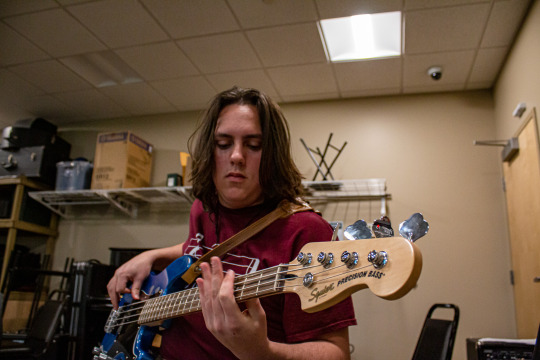
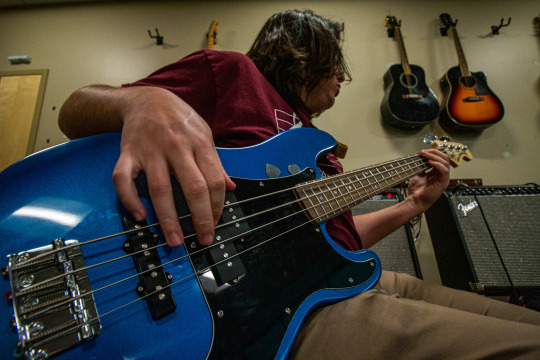
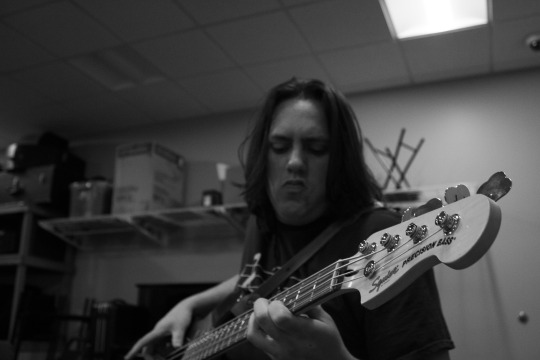
0 notes
Text
I love Jam Join! And also him

9 notes
·
View notes
Photo


DYNAMIC CHORD JAM&JOIN!!!!
#dynamic chord#dynamic chord jam&join!!!!#kashii aki#haruna soutarou#aoi yuki#kuroya yuu#suzuno chiya#momose tsumugi#ikemen#aghhh#my poor scans
21 notes
·
View notes
Photo

Dynamic Chord Jam & Join is now available on QooApp!
I think I’m going to pass on it after all as have all those other upcoming games I’m more interested in…
QooApp link
4 notes
·
View notes
Text
"Stardust Chords" (Excerpt) Josh Kiszka X Reader
Warnings: None so far, just background fluff! Enjoy! xx

Taglist: @brokenbellsos@ageofsewingmachine @sparrowofthedawn @gretavanhoney@tripthelight-fanfic @theweightofstardust @way-to-go-lad@joshkiszkasqueen
After a long day of travel and preparation for the first stop of the tour, Josh and the boys had decided that since you would be traveling with the band, they would give you the larger back cab bedroom, and they would take the bunks. After settling for a while, you hear a gentle rap on your door.
"Come in!" You say, sitting on the bed, scrolling through socials in an effort to quell the anxieties that have been biting at you since this adventure had become a reality. As Josh enters, he meets your gaze with a bright, friendly smile. "Hey, y/n, the boys and I were thinking about cramming into the "living room," if you can call it that, and having a jam session. "Are you interested?"
"Sure! I'll be there in just a minute," you say, trying to hide your excitement at his request. You knew all of their material and had been a fan of theirs for quite a while now, but had decided to play it cool. When you received the call from the label and from the boys, it had taken you days to process that it was really happening.
Entering the small living area, the boys break their attention from their instruments and banter to greet you. "Hey! who invited the stranger," Jake grins as Josh scoots over to give you room to sit. "You're worst nightmare," I say with a devilish grin as I sit beside Josh.
"Anyone got any ideas? Adlib, covers, guitar riffs?" Sammy asks the room.
You sit for a moment and consider. "Pick a song that you guys love to perform. I'll probably know it." You are curious as to which song they will choose, and hope that they land on one of the more difficult choices.
"Stardust Chords is one of my favorites, I never get tired of playing it," Josh suggests. "When I don't sound like shit at least," he adds. It is hard for you to imagine him ever sounding sub par. You had watched and were familiar with all of the live performances of their music, and they had never failed to impress you.
"I highly doubt you'd ever sound like shit," you say, adding, "Stardust chords is one of my all-time favorites. I will admit, that song is one of my go-to's when I am in the mood to belt in the car."
Josh raises an eyebrow and adjusts in his seat. "Hell yeah, let's do it then," he offers, bouncing his knee and closing his eyes as Jake and Sammy begin to strum, matched by Danny's makeshift countertop drumming. As the verse begins, Josh nods to you as you begin to sing the words that you knew so well. You do your best to create a slow-burn effect with the music, changing and contrasting your volume and dynamics to best suit the lyrics and flow from the music inside of the bus. Instinctively, Josh's arms raise above his head, moving to the music, just like he tends to do while performing. It made you blush knowing that Josh was enjoying your spin on a track that was already so beautiful.
You were grateful that he had chosen this song--you knew that it showcased your voice well; you wanted to impress them, to be wanted as part of the team. The power of your voice was undeniable, and though you believed in your own potential, approval from the boys meant a great deal to you. It was undeniable that you had talent; you had hit it big after posting videos to TikTok, Instagram and Soundcloud. Reaping so much success happened suddenly, but as it came, you were filled with appreciation when new opportunities came your way. You never imagined that you would be singing with one of your favorite bands, but yet, here you were, singing your guts out in their own tour bus.
"Yeah, it's been said, by the likes of the living and the dead."
Josh had decided to join you on the chorus, singing wild, but fitting harmonies that complimented your tone especially well. You both sing with wild abandon, feeling bound together by the mutual profundity of the moment. Tunnel vision takes over as you both reinvent "Stardust Chords," from beginning to end, adding new melodies, rhythms and runs to the original. Josh had given you most of the bridge to vocalize and adlib. On a whim, you decide to show off by belting everything up a fifth, and changing the rhythm into your own. As you belt towards the climax of the song, you hear Jake scream above the music, "Holy fucking Christ," only increasing the amount of risks you were willing to take. You feel in that moment that nothing else matters. The atmosphere was electric--not a soul was stagnant. The music moved you to a different plane, in a way that you could not explain in simple words. It no longer felt like a jam session; everyone in the room was playing their best, and, if you were to close your eyes, it was easy to imagine singing just like this in front of a headlining tour audience. As the song comes to an end, an extended moment lingers where no one speaks a word. You and your singing partner can't seem to break the profound moment.
"That...that was fucking unbelievable, y/n. Did you drink ambrosia, because I think I just witnessed God. Holy shit." Sammy quips after a moment, obviously impressed, but desperate to air out the pregnant pause that had taken over the bus. You blush and finally break the moment as Sammy interjects. "Thank you, Sammy. I love that song, I just felt like I owed it some Justice," you say with gratitude.
Josh is left in place, his face cast in an incredulous expression. After a moment, he decides to speak, "For once, you have me absolutely speechless, y/n. That was un-fucking-believable, man," Josh added.
"Watch out, y/n, you've got yourself an admirer," Jake adds, absently picking riffs on his guitar.
You laugh in an attempt to brush off the comment, but can't help but feel Josh's blushing gaze linger upon you. You don't mind it, either. In the moment, it had sent you higher than the song ever could.
***
23 notes
·
View notes
Text
Even after all these years, the whole David Lee Roth vs. Sammy Hagar discussion is still ongoing. There's no definitive answer to this debate as both singers contributed to Van Halen's legacy. But at this point, it seems as if the whole thing took the spotlight away from Eddie Van Halen.
During a recent interview with Mitch Lafon and Jeremy White, former Van Halen bassist Michael Anthony discussed the differences between the two singers and how they fit in the band. The whole discussion started when Anthony was asked about his friendship with Hagar and how long they have been loyal to each other. He replied (transcribed by UG):
"A long time now. When he first came in as a solo artist, played on a few shows that Van Halen had done. There were some outdoor shows that we did where he was an opening act or whatever. And I never knew him, though. I mean, I knew his music like everybody does. All the bands, they know each other. I know Eddie had met him, also, but I never actually met him until he walked into '5150.' After he and Eddie jammed, and he decided to come in and see what this Van Halen thing was all about. I don't even think Sammy had any intention of joining the band at that point. I think he just wanted to come to the studio, see if the party, drugs and drinking rumors were true." [laughs]
He also added:
"My introduction to him was just as the new lead singer. But we became fast friends. Because let's put it this way – I owned two cars when he joined Van Halen. I had one and my wife had one. And by the next year or whatever, I owned 10 cars, and my wife hated me for that. She owed it all to Sammy Hagar." [laughs]
But it does seem that Anthony is more of a Van Hagar than a Van Halen fan. When asked whether he thought the band was "selling out" or whether they "were doing what the band always needed to be doing," Anthony replied:
"Nothing that Van Halen ever did was a conscious effort. Even from the beginning, Warner Brothers would say 'Hey, what's the first single gonna be?' We said, 'Hey, you guys choose it. We love all our music, we made it, so you guys choose whatever you think.' And we never wrote towards that way, 'We need a number one single.'
When 'Jump,' which was our only big single from the early days of Van Halen, Roth didn't even want that song on the album, because he's all, 'Eddie, you're a guitar god, man, you're not supposed to be playing keyboards.' And Eddie, he grew up classically trained. Piano, in addition to picking up guitar.
When Sammy joined the band, I think it was just a natural progression of the band. We just continued writing and Sammy brought in this whole knowledge of being a guitar player himself, he understood structure of music and stuff like that. From that standpoint, where David would always write the lyrics and go, 'Yeah, man, play that hard or whatever,' Sammy's like, 'Hey, you got this chord here, what if we play this chord or whatever, make this change.'
He brought a whole new element, and it just kind of changed the dynamic of the band. We weren't going to continue doing what we didn't want to continue doing, what we were doing with Dave. Because that was with Dave. It's the natural evolution within the way the band was evolving."
Elsewhere in the interview, Michael Anthony discussed Eddie Van Halen's son Wolfgang and how he's "doing his own thing now." Reflecting on how Wolfgang is always associated with his father's work, Anthony commented:
"Obviously, you get pigeonholed into it, you know? He doesn't want to be known as Eddie Van Halen's kid his whole life. He wants to go out there and make a name for himself, which I totally understand and I agree with."
#van halen#eddie van halen#michael anthony#sammy hagar#wolfgang van halen#ultimate-guitar#2022#the Mitch Lafon and Jeremy White show
3 notes
·
View notes
Text
Behind The Album: Nevermind
The second studio album from Nirvana was released in September 1991 via DGC Records. This release would be their first on that label, as well as the first album to feature new drummer Dave Grohl. The album initially begin as a project for Sub Pop with producer Butch Vig attached to it at the suggestion of the label. They traveled to Madison, Wisconsin to record at Vig’s studio in early April 1990. At this time, the group recorded eight tracks including “Lithium,” “Breed,” “In Bloom,” and others, but Cobain was still working on more material for the record. On April 6, the band played a local show in Madison, but the singer strained his voice putting on hold temporarily the recording sessions as they had a short Midwestern tour that same week. After the tour, drummer Chad Channing announced his departure from the group putting everything on hold once again. Krist Novoselic and Cobain had seen the band Scream featuring drummer Dave Grohl and were impressed by his playing. By lucky coincidence, his group broke up around that same time. Grohl contacted Novoselic to see about an audition. He would join the band shortly thereafter as the bass player would say with Dave “everything fell into place.”
By this time, Sub Pop continued to have major financial difficulty, which worried the group. Cobain made the decision to forgo working with such an independent label, but instead signing with a major record company. After shopping around for a few months, they signed with Geffen Records imprint DGC after a recommendation by Kim Gordon of Sonic Youth. The label would suggest a number of producers for the second album, but Nirvana held out to continue to work with Butch Vig. The reason behind this came in the fact that they were comfortable with him. Another factor was that he did not ask for percentage points upon the release of any album. The group recorded the LP at Sound City Studios in Van Nuys, California in May and June 1991. In an interesting twist, they needed gas money to actually get to the studio to begin recording, so the band played a show for extra money where “Smells Like Teen Spirit” would be performed for the first time. The other new song that had not been worked on in the previous sessions was “Come As You Are.” The recording sessions lasted 8 to 10 hours a day as Grohl and Novoselic completed their parts in a matter of days. Cobain‘s work took a little bit longer as he added more guitar parts and put the finishing touches on the vocals. He would sometimes only finish writing lyrics just before he would sing them for the album. Butch Vig would say that he only could convince Cobain to double track his vocals when he told the singer that John Lennon used to do it. The producer expressed frustration with the Nirvana frontman. “He'd be great for an hour, and then he'd sit in a corner and say nothing for an hour." Nirvana was unhappy with the first few mixes of the album after they finished recording. They made the decision to bring in another producer to do the mixing. Eventually, they decided to bring in Andy Wallace, who had worked on Slayer’s 1990 album. Krist Novoselic she would say, “We said, 'right on,' because those Slayer records were so heavy." Nevermind would be mastered at the Mastering Lab in Hollywood. Howie Weinberg began working on the record despite the fact that nobody else from the band had arrived yet. By the time everyone had gotten there, he was essentially done. After the release of the record, the band expressed a tremendous amount of dissatisfaction with how it sounded. Everyone in the group felt that it was too commercial. Kurt Cobain said, “Looking back on the production of Nevermind, I'm embarrassed by it now. It's closer to a Mötley Crüe record than it is a punk rock record." Butch Vig would later say in an interview that it was the artist in Cobain that made him complain like that. One simply could not say in public thank you for helping to create an album that sold 10 million copies.
The major influences for Kurt Cobain during the writing of Nevermind were Pixies , the Smithereens, REM, and the Melvins. He intentionally wanted to emphasize melody in a much more emphatic way on this album. A key development came when they released the single “Sliver” before Grohl had even joined the group. The singer said it “was like a statement in a way. I had to write a pop song and release it on a single to prepare people for the next record. I wanted to write more songs like that." His goal from the onset was to write power chords that could be combined with punk rock guitar riffs. He would use the example of trying to combine the Knack or Bay City Rollers with Black Flag. One new feature of the music on the album emerges in the band's employment of extreme dynamics, meaning that there exist abrupt changes from quiet to loud verses. Guitar World would say this about Cobain‘s playing on this album. “Kurt Cobain's guitar sound on Nirvana's Nevermind set the tone for Nineties rock music." Dave Grohl would later say that the singer always stressed that the music came first, not the lyrics. He was still writing lyrics halfway through the recording of Nevermind, while Vig has said that some of the lyrics are inaudible anyway. "Even though you couldn't quite tell what he was singing about, you knew it was intense as hell." Later on, Cobain would complain about journalists trying to understand him through his lyrics. “Why in the hell do journalists insist on coming up with a second-rate Freudian evaluation of my lyrics, when 90 percent of the time they've transcribed them incorrectly?" Charles R. Cross, author of the Cobain biography Heavier Than Heaven, would claim in his book that half of the songs on Nevermind are about Kurt Cobain‘s ex-girlfriend Toby Vail. The first line of “Drain You” was something that she had actually said to him, “One baby to another said 'I'm lucky to have met you.” He modified the lyrics to “Lithium,” which had been written prior to meeting her in order to reference his relationship with her. The phrase “Smells Like Teen Spirit” was something that she came up with while living with Cobain. It was originally meant as a joke, but the singer took it as some sort of revolutionary phrase. Krist Novoselic would later comment that the track “Lounge Act” is undoubtedly about Vail.
The working title of the album had been Sheep, which Cobain thought represented a funny inside joke as to who would buy the album. The origin of that title comes from the public's reaction to Operation Desert Storm. The singer decided to change it to Nevermind because he also liked the fact it was grammatically incorrect and symbolized how he felt about life. Nevermind also referenced one of Cobain’s favorite albums by the Sex Pistols, Never Mind the Bollocks. He does mention the title once in the track “Smells Like Teen Spirit:” “oh well, whatever, never mind.”
The famous cover of the album was conceived by Cobain as well after watching a television show with Dave Grohl about water births. They first tried stock footage of water births, but the images were much too graphic for an album cover. They finally found at least one photo that may work, but the company wanted $7500 to use the photo. Finally, a photographer went to a pool to find a baby for the picture. The actual baby they found was someone named Spencer Elden, the son of a friend of the photographer. Eldonwood recreated that picture for subsequent anniversary photos for the album throughout the years.
The album debuted at 144 on the Billboard charts, but by January the record was number one in the country. The success of “Smells Like Teen Spirit” saw the demand for the album spiral in such a way that the record company could not keep up with the demand for a time. Geffen Records needed to stop printing any other albums released around the same time, so they could make more of Nevermind. At its height, Nevermind sold 300,000 copies a week. The LP would be certified platinum in November 1991, a mere 13 months after its release. The president of Geffen Records would say this to the New York Times. “We didn't do anything. It was just one of those 'Get out of the way and duck' records." The members of Nirvana seemed relatively unconcerned about the success of the album as Novoselic would say in an interview that achieving gold record status was cool, but not that important to him. By the time of their European tour in 1992, the sales of the album made any marketing ideas previously planned by the record label to be unusable.
Another interesting thing that came about through the phenomenal popularity of the album was the fact that not many places actually reviewed the album at first. Most of the reviews remained positive, but they seemed to stress the potential of the band. Entertainment Weekly’s David Browne would give the album an A minus, while the New York Times would say, “With 'Nevermind,' Nirvana has certainly succeeded. There are enough intriguing textures, mood shifts, instrumental snippets and inventive word plays to provide for hours of entertainment." The best review probably came from Everett True of Melody Maker, who had this to say. “When Nirvana released Bleach all those years ago, the more sussed among us figured they had the potential to make an album that would blow every other contender away. My God have they proved us right.” Not everyone loved the album though as evidenced by the Boston Globe saying that the record was for the most part generic punk rock. The greatest achievement of Nevermind was the fact that the record brought Seattle grunge, which later became alternative music, into the mainstream. The bands, the fashion, the culture that existed in Seattle now had made its way to Madison Avenue. The album led to the success of other groups like Pearl Jam, Soundgarden, Smashing Pumpkins, and so many more. Please check out the article later in this book on the story of grunge for further discussion on the cultural legacy of Nevermind. Rolling Stone named the album number six in its 2020 list of the 500 Greatest Albums of All Time, as well as number one on its list of the Greatest Albums of the 1990’s. In 2001, VH1 would poll over 500 rock writers and journalists for the greatest albums of all time, which led to their choice of Nevermind as the number one album. In 2005, the record was added to the national record registry put together by the Library of Congress. Even Pitchfork would name the album number six for the decade of the 1990’s. The site wrote, “Anyone who hates this record today is just trying to be cool, and needs to be trying harder."
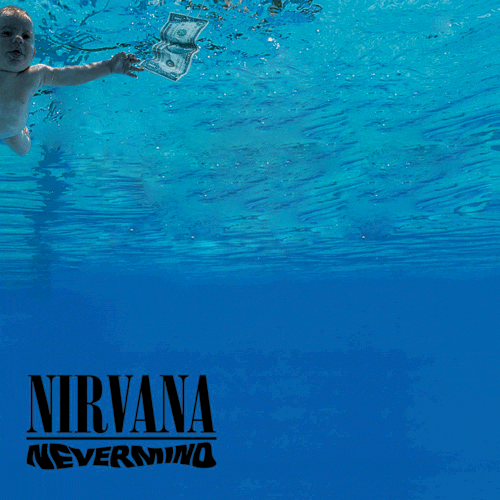
4 notes
·
View notes
Text
Delvon Lamarr Organ Trio Interview: Fo Sho
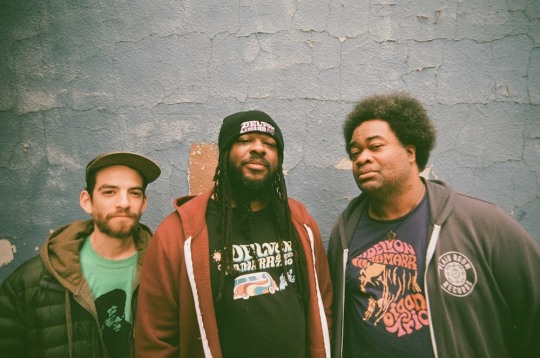
Photo by Francis A Willey
BY JORDAN MAINZER
No album from 2021 so far has me anticipating the return of live music more than Delvon Lamarr Organ Trio’s (DLO3, for the insiders) I Told You So (Colemine Records). The band’s second full-length expands upon their first LP Close But No Cigar in all the best ways: propulsive grooves, soulful moods, and an active imagination. Opener “Hole In One” introduces all the elements--funky, prickly guitar lines, confident drumming, and soulful organ--before first single and second track “Call Your Mom” and third track “Girly Face” reveal a gentler kind of sway without losing any of the sharpness. After “From The Streets” slows things down even more with a lurching rhythm and trailing reverb, the album turns it up a notch again with “Fo Sho” and “Aces”, upbeat struts with guitar and drum solos. In between that and the Stax-inspired closer “I Don’t Know” are perhaps the album’s two best tracks: a remarkably faithful, emotive cover of George Michael’s “Careless Whisper” and “Right Place, Right Time”, a solo-laden jam that begins with spontaneous studio chatter embracing the chaos of live recording. Moreover, the album contains all the elements of and is almost structured like a terrific live set, with ample virtuosic dynamism and ideal pacing.
The band on I Told You So is founding members Lamarr, on organ, and Jimmy James, on guitar, with drummer Grant Schroff (The Polyrhythmics) filling in for what was at the time a permanent drummer to be named later. (Schroff went on a European tour with DLO3 right before the recording of this album, so they decided to go with him.) Since then, drummer Dan Weiss has entered the fold; he joined as a permanent drummer last year and even toured a little bit in Canada and Montana before COVID-19 abruptly ended the tour. But while the drummers have rotated, it’s James’ guitar and especially Lamarr’s organ that have remained the foundation of DLO3, one that gives me confidence they could switch drummers every time and still one-up themselves.
I spoke with Lamarr earlier this year from his home in Spokane, WA about the various releases under the DLO3 belt (two albums and singles/live releases) as well as working virtually with a new drummer, Colemine Records, and Chick Corea (who passed away right before our conversation). Read our conversation below, edited for length and clarity.
Since I Left You: What about I Told You So is unique as compared to anything else you’ve ever released under this trio?
Delvon Lamarr: We have more musical influences in I Told You So. The reason why Close But No Cigar felt kind of reserved--we weren’t getting too deep into it--was because it was unplanned. We didn’t even have music to record at the time. But this one features more diverse musical influences of ours. “From The Streets” has that hip hop, Ohio Players feel. “Careless Whisper”--you never hear an an organ trio play that. It digs deeper into our musical knowledge.
SILY: What was the process for composing and arranging these tracks? How much improvisation was there?
DL: It’s like 90% improvisational. Pre-pandemic, we toured a lot, so we hardly ever had a chance to get in a room and write music. Plus, we all live pretty far away from each other. We basically write music during soundchecks, and when we’re on the road, we come up with these ideas and put them together. Usually, we write these melodies, and things like that, but outside of the melody, the solo areas are pretty much gloves off. Whatever happens happens. One of the things we’re known for is intertwining music with other music, different genres of music within the one song. It keeps the music fresh and keeps people engaged. It’s a free for all for most of it. [laughs]
SILY: There’s a good balance on here of songs where everyone has equal weight versus songs really led by one person or instrument. Was it important for you to achieve that balance across the whole album, or did it just end up naturally like that?
DL: It’s just how it ended up. When we write music, we pretty much write grooves. Take “Call Your Mom”: That whole song was built around Jimmy’s guitar riff, so that is the melody. When we wrote that, we actually wrote it on the road during soundcheck. I think it just naturally happens. Whatever instrument we think sounds good, we’ll play that melody.
SILY: Has Dan been learning the tracks?
DL: Oh yeah. We’ve been writing music together. Right now, we multi-track our ideas or sing it into a phone and try to build it that way. A lot of these new tunes we haven’t actually played, because we can’t get in the same room, so we just go for it, man.
SILY: What about “Call Your Mom” and “Careless Whisper” made you want to release them as singles?
DL: That was a decision between my wife [and manager Amy Novo] and Colemine Records. I probably would’ve chosen “Call Your Mom”, too. It has a certain feel and groove to it, man. [laughs] “Careless Whisper” is funny, too, because I wasn’t even gonna record that tune. My wife really likes when we play it--she requests it at the end of shows. She convinced us to record that. I was like, “Nobody wants to hear ‘Careless Whisper’ by an organ trio.” She said, “Dude, just do it, it’s gonna be really good.” We did it, and I was wrong. The reception from that tune has been pretty amazing, actually. I thank her. She’s the reason we recorded it.
SILY: You play a lot of covers live--on the KEXP release, you did “Move On Up”, and last year, you released a cover of “Inner City Blues”. What’s your general approach to covers: Be faithful, or put your own spin on it?
DL: The spin of playing a cover tune just happens naturally. Take “Careless Whisper”: We try to play it like the recording, like the original. I work on phrasing the melodies like George Michael sings it. The way we end up doing that automatically puts a certain feel to it that naturally happens. I feel that way about all of them, even when we do “Move On Up”. I play the melody like Curtis Mayfield sang it. I try to get all of his nuances.
SILY: “Fo Sho” was released on the same single as “Inner City Blues”. Why didn’t you include “Inner City Blues” on the record? Is two covers too many?
DL: Not at all. Close But No Cigar had 4 covers on it.
SILY: That’s true.
DL: We just had a lot of original music we wanted to get out. I Told You So is part of a session that had 27-28 songs recorded. We have another album or two, or an album and a couple 45s worth of music just in that recording alone. We’ve done more recording since then, so we have more music in the can right now. We just wanted to get original tunes out. We did record some more covers that will be out later on, either as 45s or something else.
SILY: The record’s really crisp, but on “From The Streets”, the trailing reverb of the guitar is a hazy contrast to the rest of the album. Can you talk about that track?
DL: The history of that track--basically, I grew up in the streets. I was a rough child. [laughs] I had that music in my head that reminded me of my childhood of running the streets. When we recorded that, you never really hear an organist in an organ trio play a bass line. I don’t play chords in that tune at all. A lot of that magic is Jimmy James. He doesn’t use guitar effects. I actually recently got him to use a wah in a show, and it took him five years to do that. He’s straight guitar and amp. He’s always been that guitar player. That tone, that sound, that reverb is just him and his amp.
SILY: Was that actual studio chatter at the beginning of “Right Place Right Time”?
DL: [laughs] I was wondering when somebody was gonna ask me about that. The song we recorded before, we played the whole thing start to finish, absolutely perfect, without a single flaw. Grant, maybe the last four or five seconds, completely bites it. We were playing, and he forgot to do a break right at the end and kept playing, so it was an unusable take, so he screamed, “Fuuuuuuuuck! Fuuuuuuck!” That’s what we were referencing at the front of it. Jimmy James was like, “Remember that time you were like, ‘Fuuuuuuuuck,’ and then I started copying Jimmy.” It was pretty funny. We listened back to it, and my wife was like, “We gotta leave that in there.”
SILY: Is there an extra guitar on that track?
DL: There is. The guitar player from the Polyrhythmics, Ben Bloom. It’s funny how that worked, because he came to see Jason [Gray], our studio engineer, and I asked him whether he had his guitar with him, and he did, so I said, “Grab it, let’s record something!” He said, “I got about 20 minutes, I gotta be somewhere.” I just started messing around with this bass line, and everything started falling into place. We did two takes of that song. Over about 15 minutes, we wrote that entire song and recorded it. At first, it was just one quick bass line, like a short bass line that I had the idea for, and we started building on it. Ben came in, put his magic on it, and it was a wrap, man. I love that solo, too. It’s dope.
SILY: What’s the story behind the record title?
DL: When our original drummer left the band, people were worried about the sound of Delvon Lamarr Organ Trio, because he had such a distinct style of playing. People assumed we’d sound different. I kept telling people, “As long as the music is good, people are gonna like it. It might feel different, but it’s gonna feel good and sound good.” That’s why I called the album I Told You So. Because it sounds good!
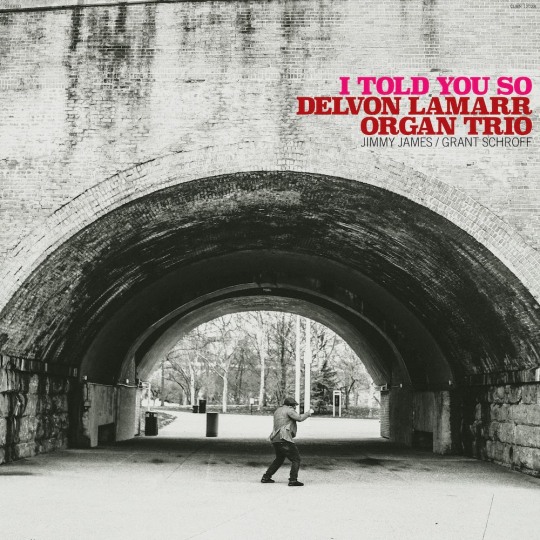
SILY: What about the album art?
DL: People are always wondering what I’m doing on the front of that album. I was shadowboxing--I used to be a boxer in my youth. We were taking photos in Cincinnati, and it was one of the photos everybody liked.
SILY: What does it mean to you to be on a label like Colemine Records, diverse in terms of genres but a wholly old school vibe.
DL: Our relationship is really good. They’re cool cats, man. It’s truly an honor to be a part of what they do. Since we’ve been with that label, I’ve met a lot of the artists on that label. It’s a gift to be a part of what they do. One of the big reasons I really like them is that it’s managed by two brothers that run it who are just normal dudes. They ain’t corporate. I talk to them like we talk to each other. It’s like family. I really respect these guys and what they do. It’s amazing being a part of what they do.
SILY: For sure.
DL: That’s “Fo Sho”. Just kidding.
SILY: Are you planning on doing any live streams or socially distant shows down the line, or are you waiting for things to calm down more?
DL: We’ve done a few live streams so far. We have more coming up. We’re working on some stuff. A lot of the tours we had scheduled last year got rescheduled to this year, so we’re seeing what happens, but right now, we’re still trying to book shows and see if it can be done safely. If it ain’t gonna be safe, we’re not gonna do it. We’re just hanging in there still, trying to keep things on the books.
SILY: What else is next for the Trio?
DL: We’re working on a new project that we’re gonna call DLO3 and Friends. Basically, Delvon Lamarr Organ Trio is gonna be the basis for the band but we’re gonna incorporate musicians we’ve met on the road all over the world that we’ve liked and start collaborating with people. We just went in the studio a couple weeks ago and laid the foundation. It’s comin!
SILY: Anything you’ve been listening to, watching, or reading lately that’s caught your attention?
DL: I’ve been back in my old school traditional swinging jazz, Kenny Dorham, Johnny Griffin, Coltrane, Miles, all those guys. I was originally a straight up swinging bebop player and haven’t been able to do that in a while.
SILY: Speaking of Miles, did you hear that Chick Corea passed away?
DL: I did. That was a pretty sad moment. We have the same booking agent. I never got to meet him. I was hoping to.
SILY: Do you have a favorite piece or recording of his?
DL: Yes. The Blue Mitchell album The Thing To Do. I remember listening to it; Chick was burning on it. One of the other things I realized on that album was how high pitched Al Foster’s toms are. But yeah: huge loss for the scene.
SILY: Anything else I didn’t ask about you want to say?
DL: Support your local record stores. There may or may not still be our limited pink vinyl at your local store, since those were only sold at record stores. Support your local record stores and local music.
I Told You So by Delvon Lamarr Organ Trio
#delvon lamarr organ trio#interviews#delvon lamarr#jimmy james#francis a willey#colemine records#grant schroff#amy novo#i told you so#dlo3#close but no cigar#george michael#dan weiss#covid-19#chick corea#ohio players#live at kexp!#curtis mayfield#ben bloom#jason gray#dlo3 and friends#kenny dorham#johnny griffin#john coltrane#miles davis#blue mitchell#the thing to do#al foster#colemine#fo sho
3 notes
·
View notes
Note
do you have a preference between the small faces or humble pie, or do you like them both for completely different reasons?? love u and your work lil ice cream 💞☀️💗
oh emmi !! you call me out with this ask, but i love you for it. My preferences depend on my mood or time of day ~ BUT I LOVE THEM BOTH SO MUCH.
small faces : a talented young mod R&B band with a later psychedelic exploration in their music. They’re defiantly more fashionable and impressionable on the public eye at the time of the mid 1960s. The glorious patterned blazers, suits and scarfs!! But there was a ‘fun’ element and a sense of creativity to their music which is more noticeable later on, and you can feel that dynamic between them: a band of brothers. They grew up in a band together and there was a lot of enjoyment, as well as the quarrels, but they had fun!! TIN SOLDIER was their peak, and they couldn’t conquer it. i sometimes wonder where they would’ve headed to if Steve didn’t left the band after a ‘new years’ performance gone wrong. There was an opportunity for them to develop their sound even more, but after ‘lazy sunday’ their band image couldn’t be taken seriously; as they were still seen as a teen bop band. Steve eventually wanted Frampton to join the small faces, but the others didn’t like the idea and that’s that. However, Ronnie Lane is a brilliant songwriter and his influence in the songs made Steve’s writing stronger; they really had a way of balancing each other out. Ronnie was more of a story-teller and is quite lovely!! The small faces radiate happiness and lots of good times!! they had a lot of imagination, youthful vibrancy and energy!! fluffy haired boys!! they were a rock ‘n’ roll band, but they were suppressed into this ‘pop’ image ~ a real shame!! their 1966 marquee club performance probably represented their true selves & their sound the most!! Mr. ‘Plonk’ Lane!! & sweaty Marriott!! i miss them.
humble pie : Peter Frampton’s folk / 'jazzy’ songwriting band turned heavy rock ‘n’ roll, to an eventual bluesy & soulful sound. An American-influenced band. They started off with three frontmen: Peter, Steve and Greg sharing vocals and verses!! quite a new and interesting dynamic at the time. There’s a lot of beautiful crafted songs on the earlier albums!! they use to jam out in country fields with their acoustic guitars and had an audience of cows. But overall, i just love Steve’s heavy songs & his rock ‘n’ roll image ~ making all the audience and the women wild!! it’s too addicting the energy and the power that he possesses!! so controlling with those vocal chords of his!! Their Fillmore live performances are !!! and darling Peter Frampton is a guitar god, his guitar sound is so heavenly beautiful. Frampton did leave after 1971, prompting the band to go down a heavier, more disruptive direction, but there’s still a lot of great albums!! 1973 soulful Steve is worth a look into, especially his dynamic with the blackberries (a black female singing group); such a beautiful soulful & groovy sound!! he really had a lot of fun singing cover songs!! Steve in his 20s, was defiantly a wild time to be alive and to witness!! Overall, Marriott is a bluesman at heart ~ he really knows his way around a guitar and a harmonica ~ and his voice is a powerful instrument too!! i love him.
~ thank you for sending me this ask!! and for allowing me this opportunity to ramble on about my faves like this, ily!! you’re literally sunshine my love!!
3 notes
·
View notes
Text
Murdoc Surfer AU Character Page

Murdoc Niccals: Gorillaz co-founder/bassist
Basic Information:
-In this au, Murdoc is very calm and collective, he keep to himself often, but if he needs to stand up for himself/his bandmates he surely will
-He’s 24 years old, he lives in his own apartment, which he bought as soon as he was able to move out of his dad’s house
-He has a very good relationship with all his bandmates, though he's still depicted as the snarky/sarcastic one
-He and Noodle have a frenemy dynamic, she’s the one who keeps him in check most of the time. They're the ones who bicker the most but its usually nothing but playful arguing
-There’s no abuse between him and 2D, they're very chill and close with each other, they often write music and watch horror movies together
-Russel is like the brother he never had, they live in the same apartment building which was the cause of them meeting each other and spawning the idea of Gorillaz.
-He spends all his time on Gorillaz when he's not selling weed/working at a gift shop to pay rent, he's very passionate about the band
(backstory under cut)
Backstory leading up to the current events of the au:
Murdoc had a decent life in his early years. His mom and dad were happy together, and he had an older brother, Hannibal, who he spent lots of time with. Though that all changed when Murdoc and his mother got into a fatal car accident. Murdoc came out fine with nothing but a broken arm, but his mother died in the crash.
After this incident his father started isolating himself and would rarely leave the house. He spent most nights getting drunk and sitting in his room, but then soon escalated to verbal and physical abuse toward both boys. This is what caused Hannibal and Murdoc’s relationship to fall apart. Hannibal began to blame Murdoc for their moms death, and their dads abuse, he would refuse to speak to him if he didn’t have to.
While getting over grief and distancing himself further from his family Murdoc discovered his love for playing bass when he found his dad’s old guitar while cleaning out the garage. He began to dabble with it, and taught himself to play by listening to ACDC, KISS, and Ozzy Osbourne cds and repeating what he heard and found he was particularly good at it. Playing bass was one of the only times he felt content and happy at home
The abuse and neglect soon became routine over the years to the point where it would be strange to think about if their mom were still alive. It went on all through elementary and middle school, and would continue through high school. High school was one of the toughest times for Murdoc because he was experiencing difficulty with finding his sexual preference. All his life he thought he'd been attracted to girls, until he suddenly develops a crush on some guy.
His dad and brother are openly against the lgbt community and he knows he can't talk about what he’s experiencing with anyone. The years of abuse finally catch up to him around this time and he begins developing bad habits like smoking, drinking, aggressive behavior, staying out late, etc. After lots of time thinking things over he comes to the conclusion he’s gay and is terrified at the fact that he is. But then soon after the decides that’s what he identifies as he develops feelings for a girl at school and is even more confused.
Despite him skipping school a bit, Murdoc got decent grades and ended up gradating high school. As soon as he did he moved away from his dad and brother into a small apartment a few miles away. But he’s still confused about his identity, an active drinker, and practically a hermit even after graduation.
After a night of drinking and wandering around, Murdoc finds himself on the side of the road, close to being unconscious. He damn near passing out until some guy helps him to his feet and walks him to a car, he really doesn't have the energy in him to protest so he just lets the guy take him to the car. He waked up the next morning on a couch in some random house. He tries sitting up but a splitting headache hits him like a bus and forces him back down. A few minutes later a tall dude with strange blue hair and black eyes comes hobbling toward him with a limp.
Murdoc soon discovered the stranger was the same guy who picked him up the night before and his name was Stuart Pot, or more commonly Stu. He explained to Murdoc how he just saw him laying there and couldn't just leave him. Muds found it weird that Stu would just pick some random up off the street, but was grateful he did anyway. The two bonded quickly and began hanging out more frequently. Murdoc was the one to give him the nickname 2D after he learned the reason for the two dents in his head were from two separate incidents which caused 8ball fractures in both his eyes.
As they grew closer Muds did eventually tell 2D about how he moved away from his dad and brother, how the abuse affected him, and how he’d been questioning his identity since he was 14. He told him he had no idea what was wrong with him. 2D was very supportive and became a total shoulder to cry on for Murdoc and was the one who told him about how its alright to not have a preference and that there wasn't anything wrong with him at all.
2D had a huge impact on Muds and helped him learn to let go of what happened in the past and accept himself much more than he would've if the never met. He also helped him out with cutting down on drinking, getting a job, and Murdoc developed so much because of him.
Once he got back on his feet he decided to use the extra money he'd been earning to buy his very own bass guitar and amp since the one he always used he never bothered to pick up at his dads house. It was his literal pride and joy and he would play it constantly.He played so much that he started writing his own riff and playing them. He especially loved playing in the late hours of the night but neighbors, not so much. He'd gotten many complaints from his neighbors about the noise but he really didn't care, until one night while he was jamming out he heard three harsh knocks at the door, followed by three more not less than 3 seconds later. Murdoc opened the door and there stood some guy in a gray, baggy hoodie, ripped jeans, and a Run DMC snapback. But the strangest thing about this guy were his eyes, they were ghostly white and vacant. Muds was expecting to get hell from this guy but was surprised when the giant of a man standing in front of him uttered
"I like what your laying down man"
He walked in Muds' apartment without another word and introduced himself as Russel Hobbs, he explained he was a musician himself, a drummer, and gifted one at that. Murdoc showed him more of the things he was working on and Russel loved it, they eventually began talking more and Russel brought Muds to the warehouse where he kept his drum set (since thats WAY too loud for an apartment) and played a few quick things, and he was beyond impressed. They soon began collaborating and came up with the idea that they should start a band and gave it the name Gorillaz.
All they needed now was a guitarist and vocalist. While walking around posting ads for a guitarist, Russ and Murdoc found a young woman playing an acoustic guitar on the corner of a strip of shops near the beach. Her case was open and full of money from admirers passing by. She'd gathered a small crowd and was playing a complicated series of tabs and chords neither of them could depict, they new they had their guitarist. They stuck around until she began packing up her stuff. They approached her with the guitarist ad in hand and explained their interest in her skill. She was totally down for the idea, and told them she'd definitely contact them, and soon learned she went by the name noodle
They had a guitarist, bassist, and drummer now all they needed was a vocalist. They were getting nowhere with finding a singer so Murdoc decided to ask 2D and see if he knew anyone who'd be interested. 2D was fascinated with the fact his friend was starting a band and told him he could be the vocalist. Murdoc was hesitant and doubted him at first because 2D's voice wasn't exactly the smoothest, but 2D insisted he let him at least show Murdoc what he can do, so he agreed.
Murdoc then got Russel, Noodle, 2D and himself in his apartment to introduce everybody. From the looks on Russel and Noodle's faces Muds knew they thought the same thing he did when 2D first asked him if he could join, but nonetheless they wanted to give him a shot.
They showed him a song they were working on and gave him the lyrics, he scanned through them with a very focused look on his face and they started playing and he started singing. Once he sang the first few verses everyone stopped playing and stared at him wide eyed. 2D sounded incredibly smooth and his range was perfect. They decided then and there that they had their vocalist.
46 notes
·
View notes
Text
DELTA SLEEP INTERVIEW

Delta Sleep, an indie quartet based in Brighton whose sound is sonically cinematic and as broad as the many cities and countries that they've toured.
Ghost City, their latest release covers many musical terrains and spectrum of sound that form a compositional coalition between the cooperatively complex instrumentation and vibrant vocal craft work contained in Devin Yuceil's lyrics.
Each track feels like a new colourful border for the listener to explore. Opening new auditory pathways with each listen. I met with Delta Sleep on their most recent tour in Southampton to discuss how they became musicians and their processes throughout the creation of their new album Ghost City.
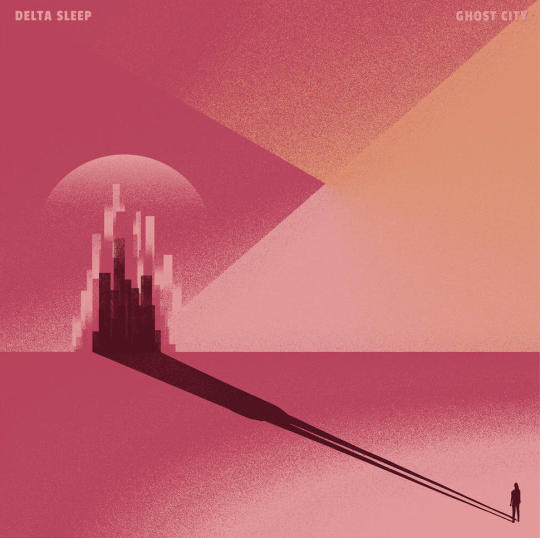
At what point did you realise that music was something that was important to you and what bands and artists were the first to influence your interest in music?
Devin: The first genre of music that I really got into and really cared about was punk, an older friend of mine from college had some of the early albums from Weezer, Green Day and NoFx which we used to listen to in his basement. It was quite extreme back then and we felt like we were being really rebellious.
Those bands inspired me to start learning to play guitar and write shit punk songs filled with power chords about girls and the establishment.
Blake: I first got into music from listening to a lot of trance and garage. I used to buy those compilation albums from Ministry Of Sound and Judge Jules which led me to start listening to The So Solid Crew and The Heartless Crew.
Nu Metal bands like Korn and Deftones were what inspired me to become a drummer since it was a combination of metal and hip hop which, are the main genres that I’m currently listening to at the moment.
David: I listened to a lot of Trance as well, Cream Anthems and then Iron Maiden.
Glen: I used to listen to NoFx, a lot of NoFx, I was even in a NoFx covers band we were called YesFx5000 though, we only played show. I loved Deftones and really got into Aphex Twin and Bjork but in the beginning Pop Punk and Punk Rock were my main jam.
Delta Sleep - Sans Soleil
youtube
How did you all meet and what do you feel that everyone brings to the table creatively and how do you work together as a band?
Devin: Me and Glen met at uni, he had dreadlocks and was really into juggling, we found that we had a similar interests in music and I learned to never judge a book by its cover.
Blake: I joined the band later and saw that they really needed a solid rhythm section, my role in the band is bring a sense of structure to the songs and provide a core rhythmic backing for the weird and sporadic ideas that Glen and Devin come up with. Like most bands we jam out ideas and shape the content of the song as we go.
Glen: I definitely take the role of guitar riff guy.
Dave: Its definitely more of a collective effort in the they we work now.
Devin: Our more recent material is mainly defined by the vocals which has been the main factor in deciding how long a section should be and where they should change or repeat. We've been focusing on using more standard song structures to write the new material which is something we haven't really done before.
How would you describe the approach to your instrument and what bands and artists shaped the creative core of your style?
Glen: Enablers really changed the way that I thought about guitars and how operate in a band, their music features a lot of space, there's a lot of points where instruments will cut out and stop playing throughout a song which gives everything room to breathe in a really unique way.
Our earlier material used to have tonnes of guitar riffs and ideas that would go on and on and on which, really worked for us in the earlier stages of Delta Sleep.
I'm now writing music that's completely parallel to that where the songs are three minutes long and have lots of repeating sections.
Me and Devin were in another band where I played bass and Devin played drums. The guitarist’s philosophy was to do everything live, record in three takes, songs should only between two and three minutes long and any ideas go into another song. I’m using more and more of those ideas now in our newer material.
Blake: Personally my approach is to start writing something simple, find the backbeat and then add in various different parts making it more complicated or full as I go along. As previously mentioned I listen to a lot of hip hop so finding that backbeat is one of the core elements of my style.
Delta Sleep - El Pastor
youtube
How do you push yourself musically and ensure that you are exploring new creative realms?
Blake: I try to listen to lots of different music and incorporate different styles into my playing. Our sound is always changing because we're all listening to different types of music and experimenting with lots of different genres. That's how you develop your own sound and style. If you are just listening to one style of music you'll only learn how to replicate instead of innovate.
Glen: I've stopped overthinking my guitar parts, sometimes having the most simple idea is the best idea, improvising can sometimes bring out the best in your playing as well. If you are thinking about a part for too long then it probably isn't the best idea you could come up with.
How do you feel that working on Ghost City has pushed you creatively and how do you feel that you have changed as musicians? How did the original ideas that you had at the beginning change as you worked through the album?
David: I feel like we've become more ruthless in regards to writing and less precious about specific parts, riffs or ideas.
Twin Galaxies had a lot of parts that we had to fit together whereas with Ghost City any parts or ideas that didn't work were saved for another song so, instead of having 10 riffs we'd have one riff that was fully fleshed out and developed.
Simplification over complication is what we were after with Ghost City. There's still plenty of proggy moments but its fleshed out between the verses and choruses of each song.
Delta Sleep - Single File
youtube
When recording Ghost City in Italy I read that you were also playing shows alongside the creation of the album and recording everything live. How did that compare to working on Twin Galaxies? Is this a process that want to repeat in the future?
Devin: We had a tour booked either side of the studio and a few shows booked leading up to those tours as well, we ended up playing a lot of the new songs live which led us to capture the most natural elements of us playing together as a live band.
Glen: Recording live really changed the overall result of how we sound on the album, knowing that everything is being recorded at the same time eally pushes you to make sure that you really the know how to play the songs and work together efficiently.
We knew from the beginning that we wanted to capture the mood and feel of each track which and doing that live allows you play more expressively and dynamically. Recording everything live provided us with the inital pressure to play as best as we can and capture everything in that single moment during each performance.
Blake: You can punch in for everything and that's fine but it can really take out the soul, recording live captures the vibe and feel of that moment of a bands performing. Capturing that live element actually makes the tracks feel like something more than a recorded piece of collected information that sounds perfect and has no human element.
David: Having that tour on the way down really helped us to play the songs that would be featured on this album, so we were really well rehearsed since we had to play these songs live to an audience and in the studio.
You can do thirty takes and it can really take the love you have for a song because you've focused so much on planing each part perfectly. Playing live doesn't give you the option to go ever that much detail since your only playing in that moment.
Devin: We still overdubbed a few different parts which was mainly doubling up distorted guitars and adding different textures with delays and other pedals to create other sonic textures.
Recording our parts live beforehand allowed us to spend more time to have more time to experiment with pedals and all of the other interludes.
Floater was actually finished in the studio when we were in Italy. We didn't want to change it a lot or over compose anything or really spend a lot of time analysing the parts as the interludes served as a documentation of the time that and moment we spent in Italy.
Delta Sleep - Sultans of Ping
youtube
Tell me about the concept for Ghost City, how you came up with the idea to take this creative direction or approach to about the effects of technology on society? How do you think technology and music are working together and do you feel that more bands are taking the organic approach to recording and writing like you did on Ghost City?
Devin: We never sat down and discussed how the album would sound or what musical direction we should follow in terms of a creative idea or blueprint. I feel that our music is cinematic, when writing lyrics I like to place myself in a world or write from the perspective of the people in that world and what they may experience, whether that be tastes, smells, relationships and culture. I feel that process allows me write lyrics thataren't typical and based around common themes or subjects.
When was the last time you listened to music that you feel that really pushed the boundaries of music?
Blake: James Blake's The Colour Of Everything really changed quite a lot for me and I never really understood his music until that album out. The approach to production is something that really stands out and has loads of textures and chopped up vocals. Its a really dark sounding album.
David: There's a band of Ovlov which is I think is meant to be Volvo backwards.
Glen: It's kind of a throwback to music from the early 90's similar to Weezer of Foo Fighters.
Devin: It's like what we talked about earlier where bands are going back and re inventing a genre or style of music and taking a different approach to the simplicity of that music.
What advice would you give to other bands are starting up now and lessons have you learned a long on the way?
Glen: I've learned from making mistakes when I was younger and wouldn’t change anything at all, it’s all part of the learning process of becoming a better musician.
I've written some absolutely awful songs but that's allowed me to become better and understand why they weren’t great and how to improve myself as a songwriter.
My advice to other bands is to get your own personal means of transport, learn how to drive and get a van if you can.
If you can drive then you can play a show anywhere without having to rely on anyone else that could potentially let you down in the long run. Play as many shows as you can outside of your home town and find bands that you love. Try to play with shows with them and gig swap its the best way to form contacts with promoters and bands in different cities.
I’d also recommend recording everything live if you can and do it as often as possible.
Devin: Avoid any promoter that asks you sell any tickets for your own show, it can be a complete scandal and really rip you off. Don’t always settle on the first idea you come up when writing, ensure that you and everyone is happy with what you are playing. Try lots of ideas and don’t just follow other bands because they are doing something trendy, you can find your own voice and it may take some time but it’ll be worth it in the end.
David: Be open to chatting to people at a gig, you never know who you are going to meet or who'll be at a show. I think all bands should know how to put on their own gig and do it completely of their own backs. Its a great learning experience and as you soon as you learn how to put on a show then you have less chance of being screwed over. It'll help you learn how the industry works, try to pick the best shows for your band and try not say yes to everything.
Please follow Delta Sleep and support their music by checking out the links below as well as their upcoming West Coast USA Tour
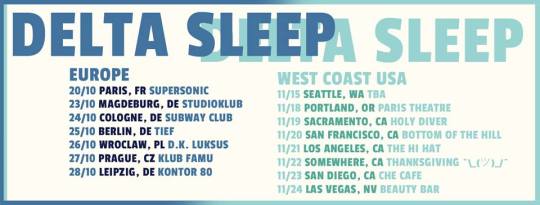
Tickets: https://www.facebook.com/tours/322098818343652/
https://www.facebook.com/deltasleepband/
http://deltasleepband.com
https://deltasleep.bandcamp.com
4 notes
·
View notes
Photo

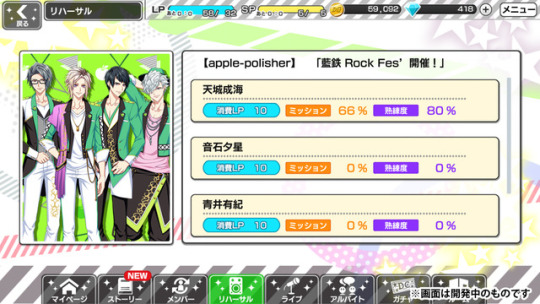
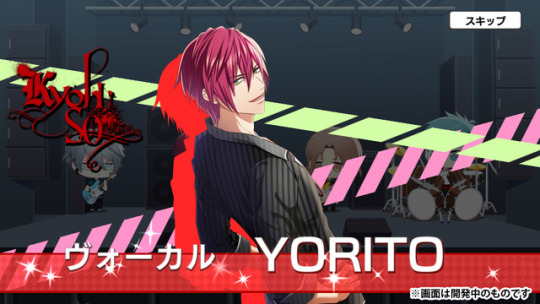
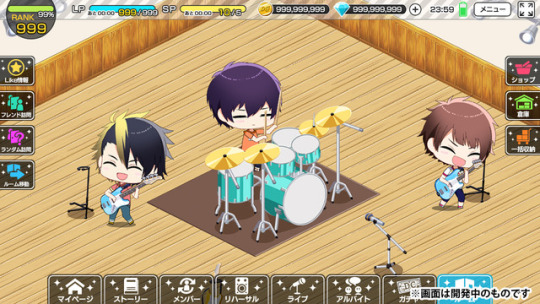
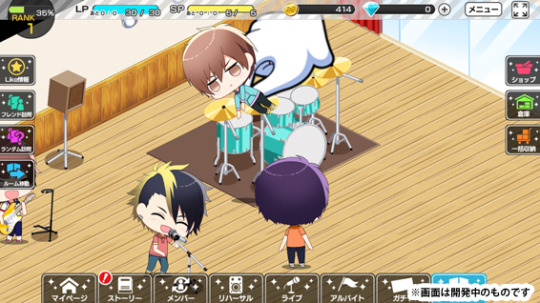
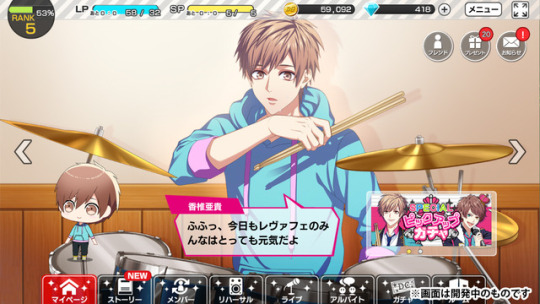
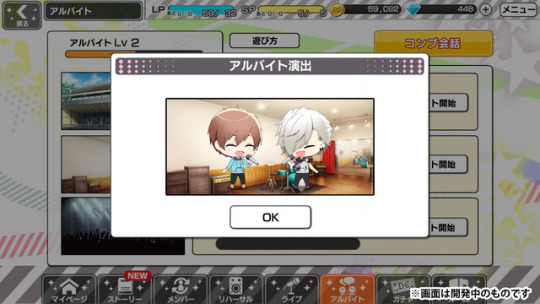
And then I caved in and preregistered for ‘Dynamic Chord Jam & Join’ after all coz it looks rather cute from the gameplay screens they’ve released so far… ^^;; I like that you can pick up the chibis! XD
Anyway, didn’t preregister before coz none of the characters really grab my attention, but now I’m all ‘I’ve basically preregistered for all the other non-dating sim mobile otomes, so might as well…’ orz
I’ve seem Dynamic Chord stuff around but know nothing about it. So far it seems to be about bands instead of idols and the art seems very much like A3?? And I think I’ve heard before that it had an anime but it was apparently horrible??
Oh well, we’ll see what happens when it comes out.
Source
3 notes
·
View notes
Audio
TOO GOOD TUESDAY INTERVIEW: New Chums
New Chums may be a Phoenix based band but their roots extend from all over the country. The foursome includes Seth from California, Ben from Boston, Matt from Nashville and Cassandra from Michigan. Their diverse backgrounds have come together to form this indie rock band that is still riding the wave of the release of their debut EP, See It For Myself. The EP brings together big energy, heavy guitars and shining vocals that come together to form a sound that is both unique and familiar at the same time. Lucky for Too Good Music, the foursome recently took some time to answer some questions about the EP as well as their song, “Come On Come On.” They also discuss how they promoted their EP in a vending machine, what they would like to see before they die and much more below!
TOO GOOD MUSIC: So diving right into it, how did you guys come up with the name New Chums?
SETH (vocals/guitar): I got the name New Chums when I was on holiday in Sydney, Australia. I was in a history museum when I read a placard that described how when new prisoners were arriving in the Sydney harbor the current prisoners would say, ‘The New Chums are here.’ Something about the idea of random people coming together as New Chums resonated with me. When I was putting the band together, and seeing how none of the band members knew each other when we started the band, the name New Chums only seemed fitting.
TGM: Interesting! So yeah going off that idea, you guys are from all over the country…how did you guys all meet and end up becoming a band?
MATT (guitar): Yea, like Seth said, no one knew each other before the band. All of us moved to Arizona over the past few years for various reasons, so we are all transplants to this area. Since I was new to town, I had just put up an online ad if anyone needed a guitar player for some paid gigs to reach out. Seth ended up emailing me and sending me a few of their early recordings. I liked what I heard and thought my guitar playing could really fill up their sound as there weren’t really extra guitar parts on the demos. We met up and jammed and got along really well, so that’s how it began for me. Same thing with Ben before me and then the 3 of us auditioned Cassandra a few months after I joined and it all clicked. So the current line-up formed pretty quickly and then 2 months later we went into the studio to record our first EP together.
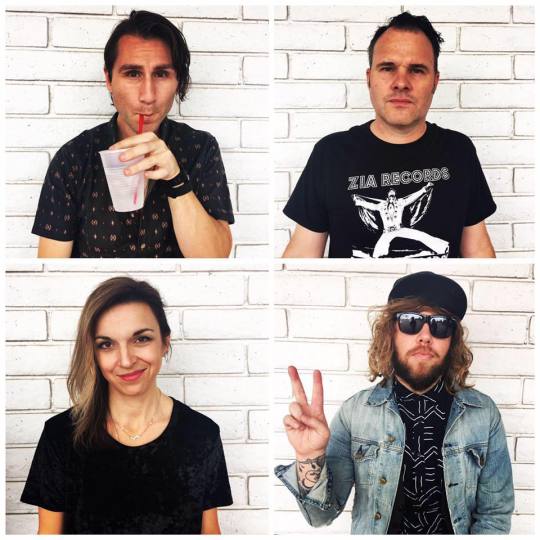
TGM: Speaking of the EP what was the inspiration behind “Come On, Come On” and what does that song mean to you guys?
SETH: To me, “Come On, Come On” is about the overall feeling it leaves you with. That feeling is going to be different for everyone who hears the song but my hope is that it fills people with energy and excitement, especially at a live show, and keeps them coming back as our shows get bigger and better. What does “Come On, Come On” mean to us? Hopefully it means we’ll be cashing huge paychecks in the not-so-distant future. We can be a little sarcastic and dry if you can’t tell…
TGM: Ha! I can see that. Continuing on the EP, its titled See It For Myself – what is something that you’d like to see for yourself, in person before you die?
CASSANDRA (bass): On a large scale, I'd like to see the end of "us vs. them" mentality that seems to be pervasive right now. We are more alike than different, so I'd enjoy seeing people realize that and take a breath from all the narrow-minded BS. Smaller scale (and admittedly more selfish), I'd like to see a large venue filled with people who are singing along with all our songs.
SETH: A world tour with The Killers. Is that too much to ask for?
BEN (drums): I, personally, love seeing new countries. I’d love for the band to be able to travel overseas and play a bunch of shows. Touring elsewhere is a ton of fun, and it’d be a blast with this group.
MATT: I just had my first daughter 5 months ago, so I’ll be mushy and say I’d love to live to walk her down the isle at her wedding someday. Also, of course, along with the guys, I’d just love to get to the point where we were headlining tours and had a strong, sustainable fanbase across the US and abroad.
TGM: When you released your EP, you did it in a clever way involving vending machines. Can you tell more about the story behind that and how that happened?
CASSANDRA: First, you pour all your energy and focus into writing and arranging songs that you really like. Then you pour all your energy and focus into recording those songs, making them sound as good as they can. When you finally have that recording in your hands, you need to pour all your energy and focus into getting it into other peoples' hands. You do that any and every way you can; selling CDs at shows isn't enough, you need to reach wider. We had access to a vending machine at a large sports complex, so we threw a few copies in there, put a sticker on the outside of the machine that said "Support Local Music! You won't regret it" and we sold all the copies of our EP that we put in there. It helped break up the monotony of asking friends/fans to buy it via social media and in person at our shows. It's fun to think that people who didn't know our band, haven't seen us live, bought our EP in a vending machine and may be driving around listening to us right now.
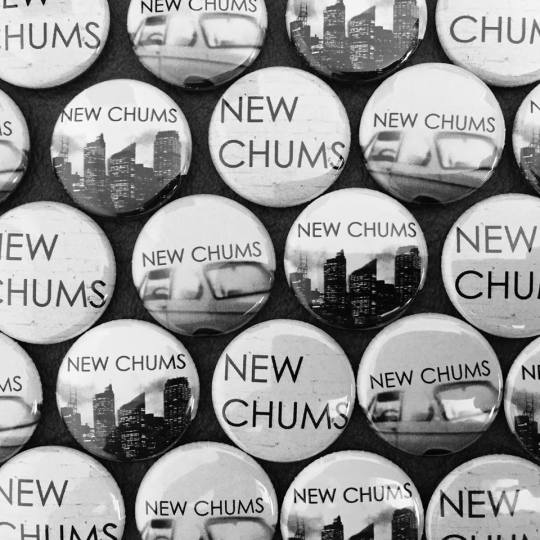
TGM: Ha! That is really cool and what an interesting way to promote an EP and I bet the people that didn’t know you before and bought the EP enjoyed what they heard. With that being said how would you describe your sound?
SETH: I’d say our sound is guitar driven with an emphasis on great tones, big hooks and melodies you can’t get out of your head. We spend a lot of time fine-tuning our songs so there’s a unique element to each individual song. The blank canvas of the melody over a single guitar lends itself for interpretation to the rest of the band members and we all collaborate on it from there to ultimately develop what it blossoms into.
TGM: Let’s dive deeper into that - what is your writing process like? Is it more collaborative or individual?
MATT: Seth will typically bring a chord progression and lyrics already in tact for a song. Sometimes, we will just begin jamming on a brand new song in full rehearsals and just all start hashing parts in real time. Mostly though, Seth and I will sit down and I’ll begin writing guitar parts off of his original structure so we at least have a general map of what the guitars will do going into full band rehearsals. From there, we begin jamming on it full band and songs can go all sorts of different directions with everyone just throwing out ideas as they come. With the end product being very collaborative, each new song usually take several weeks in rehearsals to finalize. It’s crazy sometimes to hear how much dynamically or arrangement wise some of our songs end up from where they started at that first rehearsal. That’s the cool thing about writing and creating together, also being patient and working on a song until it feels right to everyone.”
TGM: I saw that you guys performed on the main stage at the Mesa Music Festival in Arizona - what was that like? Any interesting stories from that festival?
BEN: It was hot and sweaty like rock n roll should be! The only real surprise for that show was actually finding and getting to the stage. It was our own little Spinal Tap moment. Overall, that was a fun one to play, though. Big stages are cool, and in some ways, are easier to play than smaller ones.
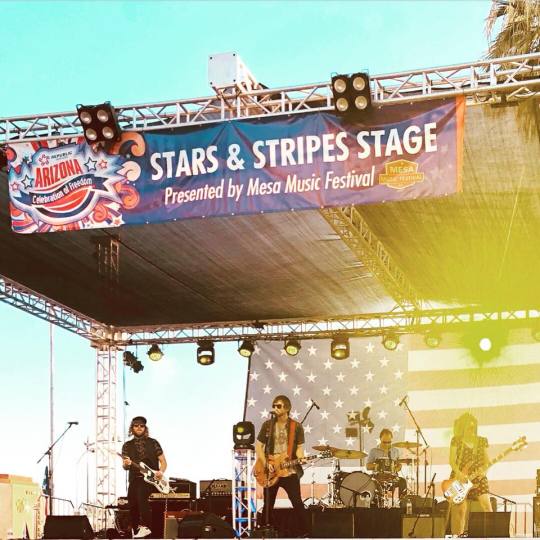
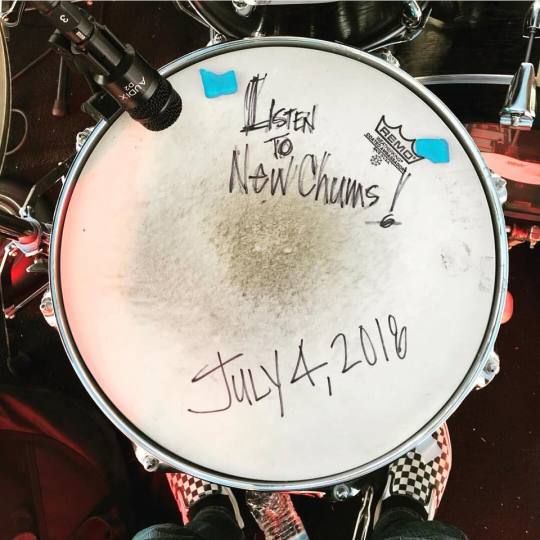
TGM: If you could headline one festival which one would it be?
MATT: I’d say Bonnaroo or Lollapalooza would be incredible
TGM: Those would be great - Bonnaroo is a favorite of mine so I’ll definitely have to make it out there if you guys headline! Individually, if you could only listen to (5) artists/bands for the rest of your life who would they be?
CASSANDRA: Wow, that's a tough question and I will be second-guessing my answer for weeks: 1) Elvis Costello and the Attractions 2) Cheap Trick 3) Frank Turner 4) Jimmy Eat World 5) Butch Walker
MATT: Weezer, Jimmy Eat World, The Beach Boys, MXPX and Copeland
SETH: In no particular order: Gerardo, Milli Vanilli, Chumbawamba, Smash Mouth, The Beatles (winks)
BEN: This is always a tough one to answer. There’s the Beatles that will always be timeless rock music and should be included. Further than that, though, I’d guess I’d want to find 4 other artists/bands that change things up a lot from record to record because I get bored easily. I think I’d just probably go crazy listening to only 5 bands.
TGM: And last but not least what does the rest of 2018 look like for you?
MATT: We will be staying busy playing mostly regional shows and a few Festivals through the Fall. There is always new music we are working on and have been playing a new song out about every 2 or 3 shows. So just keep writing and gearing up for our next run in the studio, no time table set on that yet.
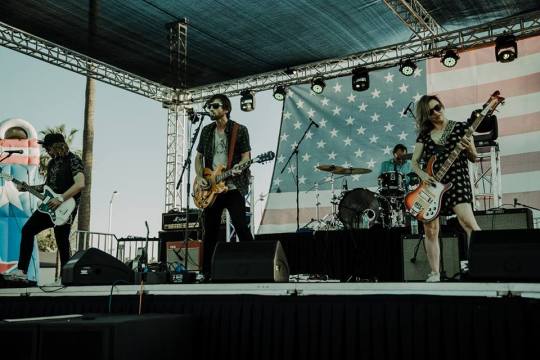
A HUGE shout-out to Ben, Cassandra, Matt & Seth of New Chums for taking the time to answer some questions from Too Good Music! Be sure to keep up with them and everything new with New Chums below:
Facebook | Instagram | Spotify | Twitter | Website
#music#alternative#indie#rock#new chums#interview#interviews#band#spotify#song#come on come on#music blog#festival#bonnaroo#lollapalooza#the beatles#jimmy eat world#phoenix#arizona#the killers
1 note
·
View note
Text
Aqualung at 50: Jethro Tull’s Half Concept Album Hits Half a Century
https://ift.tt/eA8V8J
“In the beginning Man created God,” reads the back cover of Jethro Tull’s Aqualung. “And in the image of Man created he him.” The album came out 7 million days later, on March 19, 1971. We’d only recently been told God was “a concept by which we measure our pain,” by John Lennon.
Aqualung is framed by two halves of a concept. The first songs on the first side tell the stories of the outcasts, those out of sight of the eyes of the man who created god. The B-side explains why organized religion blinds us. In between are songs which have nothing to do with either theme. First off, for those who don’t know, Jethro Tull is not a person, but a band. The songs on Aqualung were written by Ian Anderson, bandleader, singer-songwriter, guitarist, occasional saxophonist, and heaviest metal flutist to make Bach swing. Anderson maintained, throughout numerous interviews, Aqualung was not a concept record. He would go on to mock the very idea of it with the satirical prog masterpiece Thick as a Brick.
The Beatles suffered the same misnomer dilemma. Sgt. Pepper’s Lonely Hearts Club Band wasn’t a concept album. Paul McCartney got the idea the band would play the album as if they were this other band. The concept lasted two songs and a reprieve. The rest of the album is a full immersion into the possibilities of the studio under the steady gaze of George Martin. Aqualung opens with songs inspired by true life candid shots Ian’s wife Jennie Anderson (now filmmaker Jennie Franks) took while studying photography. One was a homeless man, another an under-age prostitute. Other than that, the first side includes a beautiful love song, and hard and soft confessional pieces.
The first concept album is Woody Guthrie’s 1940 album Dust Bowl Ballads, which stuck to one theme: the economic and ecological fallout of the devastating 1930s drought. Frank Sinatra explored loneliness and late nights on a pair of classic concept long-players unified by mood. Frank Zappa and the Mothers of Invention’s Freak Out!, from 1966, is the first concept album, as well as the first double-album, of rock, although every song on the Beach Boys’ 1963 album Little Deuce Coupe is about a car. The Who’s Tommy, Andrew Lloyd Weber’s Jesus Christ Superstar, and Pink Floyd’s The Wall are rock operas which tell full stories. Bands like the Kinks tried unifying songs with imperceivable segues and tone.
Aqualung delivers a consistent tone. Sometimes the songs fluctuate between soft acoustic and hard rock, other times the individual pieces grow through progressive layering. The harder and more social pieces employ metric modulation, and the religious ones dabble in the chordal modulations of spiritual music. The acoustic songs are less folk than singer-songwriter stylings. The album revels in its contrasts. We get riff-rock ready-made for Madison Square Garden, and intimate nylon string fingerings to burn toast to.
Ian Anderson’s lyrics are filled with rich, detailed imagery, regardless of how pretentious critic Robert Christgau found him. The band mix progressive rock, hard rock, folk music, jazz, classical, and even medieval and pagan music, along with what Anderson would call “ugly changes of time signature and banal instrumental passages” on the Thick as a Brick album notes.
This Was
Jethro Tull formed in 1967, the same year Anderson took up the flute, on a whim. After realizing as a guitarist, he “was never going to be as good as Eric Clapton,” Ian “parted company with my Fender Strat, whose previous owner was Lemmy Kilmister, who was then the rhythm guitar player for the Rockin’ Vickers,” Anderson told Classic Rock. He then “bought a flute, for no good reason. It just looked nice and shiny.” Energized by Pink Floyd’s The Piper At The Gates Of Dawn and The Beatles’ Sgt. Pepper, the band was able to drop the twelve-bar blues songs which led to non-pop record deals in London.
Anderson got the name Jethro Tull from the 18th-century agriculturist who invented the seed-drill, which gave birth to modern agriculture. Their first album, This Was, was blues, but the band distinguished itself, especially live. They were the first band to perform at The Rolling Stones’ Rock and Roll Circus, though their part was mimed, with Black Sabbath’s Tony Iommi on guitar. Martin Barre took over for the band’s original guitarist, blues specialist Mick Abrahams, and on their 1969 album, Stand Up, the band stood out, sounding unlike any other band. It was eclectic, incorporating Western classical, Asian music, English folk, and harder rock. The band continued experimenting melodically and rhythmically through 1970’s Benefit, which just failed to make the U.S. Top 10.
Jethro Tull has become known as a band of ever-changing instrumentalists. Aqualung was the bridge album towards reassembling one of Ian’s first bands. Anderson was 23 when he led Jethro Tull through Aqualung. When he was young, Anderson could be found in Dunfermline, Scotland, where he was born on August 10, 1947. But he was packed off to school in Blackpool, where he sang and played guitar and harmonica for The Blades in 1963. John Evans, who joined on piano, organ, and mellotron, had been a guest musician on Benefit. Jeffrey Hammond-Hammond, who’d been mythologized in the songs “Jeffrey Goes to Leicester Square,” “Song for Jeffrey,” and “For Micheal Collins, Jeffrey And Me,” replaced Glenn Cornick on bass. Both had been in the Blades. Barriemore Barlow, also from the early sixties band, would replace Clive Bunker on drums after Aqualung.
Tull mythology says Hammond-Hammond didn’t know the instrument and had to be taught on a note-by-note basis. He may very well have had to have been coached through each specific part he was playing. They are often incredibly intricate runs, and often go against the grain of what is expected from the bass. He had to have been familiar enough with the instrument to click in with both Clive Bunker and Barriemore Barlow, each were virtuosos with vastly different approaches to rhythm. Bunker never met a beat he couldn’t undermine for unexpected force and dynamic. Yet, he could make a 5/4 song danceable.
The ensemble playing is tight, the players moved easily through more intricate arrangements. The orchestrations are done by Dee Palmer, who later joined as a full-time member. The British press coined the term “progressive rock” to describe bands like Frank Zappa, Yes, King Crimson and Genesis. Tull was prog, but more accessible than classical music enthusiasts Emerson, Lake & Palmer.
Guitar Gods and Flute Solos
Jethro Tull is probably best known as the classic rock band with the lead flute. “Aqualung,” possibly their best-known song, has no flute. Martin Barre’s guitar solo was rated #25 in Guitar World‘s “100 Greatest Guitar Solos” reader’s poll. But it could just as easily have been a whirl of woodwind. “In those days, if you didn’t get a guitar solo in one or two takes, it might become a flute solo. It was, ‘Go in there and do it or else,” Barre told Guitar Player in a 2015 interview.
Aqualung was recorded in a large, cold-sounding studio that Island Records built in a converted church in London. Led Zeppelin were recording their fourth album in the moderate sized basement studio that had been the crypt. “The only thing I can remember about cutting the solo is that Led Zeppelin was recording next door, and as I was playing it, Jimmy Page walked into the control room and waved to me,” Barre remembered for Guitar Player. While there have been countless theories about why the players had the faceoff, both Tull and Zeppelin fans appreciate the dual pressure of the session. “And here was Jimmy, waving like mad – ‘Hey, Martin!’ – and I’m thinking, ‘I can’t wave back or I’m going to blow the solo.’”
The song “Aqualung” opens with one of the most recognizable riffs in rock, in the same league as Deep Purple’s “Smoke on the Water,” Cream’s “Sunshine of Your Love,” and the Rolling Stones’ “(I Can’t Get No) Satisfaction.” It has been venerated and mocked in equal measure, but in all cases lovingly. It opens the song with the drama of the four-note opening to Beethoven’s Fifth Symphony, and becomes a motif.
“Aqualung” is “a tortured tangle of chords,” according to Ian, with atonal harmonies, meaning the root is open to interpretation. The chords themselves are a journey to the acoustic segment of the song, which then builds, like most songs on the album, one instrument at a time. The audio effect on the later vocals is called “telephone burbles,” which happens when all audio frequencies are removed except for a narrow band around the 1,000 hertz mark, making the voice sound like it’s coming through a megaphone. The song has a cold ending rather than a fadeout, which makes it perfect for stage performances.
Bad Intent
Ian got the title for the album and song from the TV show Sea Hunt, where the main character, played by Lloyd Bridges, wore an Aqualung for underwater breathing. Aqualung was a brand name, and the Aqualung Corporation of North America took legal action after the album came out. Artist Burton Silverman, who created the cover portrait, also sued, saying the likeness should not be used on merchandising, T-shirts, and promotional materials.
Before the codpiece and the medieval minstrel suits and lutes, Ian performed in an overcoat, which had been stolen after a concert, but has been described as looking ratty. This led to further complications of identity. Because of Tull’s manager, Terry Ellis, Silverman’s cover portrait looks like Anderson, against the singer’s wishes. “I’m not this character,” he told Louder Sound. “I’m not a homeless person. I’m a spotty middle-class English kid. I’ve never had to sleep rough on the street, and I don’t want to be pretending to be that character.”
The character Aqualung, is a homeless man like the character in Pearl Jam’s “Even Flow.” Both characters are blank slates in everyday life and can have any association imposed on them. Besides inspiring the album through her photographs of homeless people living under the railway arches on the Thames Embankment in south London, Anderson’s wife Jennie also co-wrote the lyrics. “I had feelings of guilt about the homeless, as well as fear and insecurity with people like that who seem a little scary,” Anderson told Guitar World in a 1999 interview. The lyrics have more to do with the assumptions people make of Aqualung, like his predilection for little girls or frilly panties. But he also saw the angry man as “a free spirit, who either won’t or can’t join in society’s prescribed formats.”
She’ll Do It For A Song
“Cross-Eyed Mary” didn’t only capture the attention of Aqualung, she was one of the subjects in the photographic collection of the lesser people cast into the void: a child prostitute. The song transforms her into a squinty Mary Magdalene, whose jack-knife barber abortionist drops her off at school. In the lower income neighborhood Highgate, she’s a Robin Hood figure. In wealthy Hampstead Village, which was the site of the St. Mary Magdalene House of Charity in the Victorian era, she’s a business expense. The song opens with flute and mellotron rising in rhythm and pulse until the band kicks in. The interplay between guitar and piano is delicate, and the bass line buzzes with riff-worthy changes. Iron Maiden transformed the flute part into baroque metal guitar when they covered it.
“Cheap Day Return” is the first of three short acoustic songs on the album, each under two minutes. A “cheap day return” is a reduced-price round trip train ticket, and the song was written while Ian was waiting for a connecting train on his way to visiting his father, who was seriously ill in a hospital in Blackpool. In interviews, Anderson has said the song would have been longer, but the train arrived.
“Mother Goose” opens with acoustic folk guitar under Elizabethan madrigal sounding recorders played by Barre and Hammond-Hammond, who also provides harmony vocals. The electric guitar comes in late in the song, kicking the childhood Piccadilly Circus nursery rhymes into the adult playground of Johnny Scarecrow.
“It’s only the giving which makes you what you are,” Ian sings in “Wond’ring Aloud.” The second short acoustic piece is a simple love song made grandly beautiful by the piano and string arrangement. The longer version, “Wond’ring Again,” which appears on Living In The Past (1972), reached the opposite conclusion, but kept the idealistic romance at the center of the piece. The third acoustic piece, “Slipstream,” from side two, presses Ian’s last dime on God’s waiter to pay the tab. The song is tideless, but the unreasoning strings paddle the way out of the mess.
“Up To Me” opens not with a recognizable riff, nor a classical piano twist, but a whole hearted laugh which is as contagious as the song itself.
Praying ‘til Next Thursday to All the Gods that You Can Count
Side two, subtitled “My God,” deals with religious hypocrisy, golden cages, and plastic crucifixes. If Jesus saves, then he’d better save himself. The song “My God” had been kicking around since at least the Isle of Wight Festival in 1970. The imagery recalls William Blake and the metallic break-in sounds like Black Sabbath, both the band and the dark holiday. Once again, the song uses progressive modulation beginning with a solo acoustic guitar introduction like Evan’s piano on “Locomotive Breath.” But when Barre’s electric guitar takes over for the nylon classical fretwork, the song is full-blown metal.
Ian’s voice drips with as much disdain for organized religion as his songwriting does for musical structure. The song goes through the arpeggios of classical guitar, through hymnal chord changes, a metallic flute lead back by instruments, another flute lead back by a chorus of harmonizing bishops, inverted chromatics, and comes to a dark Pied Piper ending.
“Hymn 43” is a piano-driven soul-stirrer with enough propulsive licks to set the white man free. Ian’s preaching to the faithless on this one, though. He bears witness in the city, on the moon and on that bloody cross. The guitar and flute interplay works like a gospel call and response, and Ian’s voice stings with insinuation.
If you want to hear Ian play electric guitar, you should give another listen to the rhythm on “Locomotive Breath.” He’s also on the hi-hat and bass drum which he laid out for the basic rhythm, allowing Bunker space for tom-toms and the cymbals. The song opens with Evan giving a jazzy spin to dramatic classical concerto piano. The song, which is about overpopulation, rhythmically careens like a train about to derail. It is a concert favorite and frequent showstopper.
“Wind Up” asks this God a question and learns it’s “not the kind you have to wind up on Sundays.” The song is structured to grow on you, and age well. It begins with acoustic guitar and vocal, which is joined by the rest of the outfit until the climactic solos, and then reminiscences a second time symmetrically with piano grounding the build-up. In a fairly straightforward song, Bunker plays everything but a straight beat.
Anderson concludes, in the liner notes which are cast in liturgical-style Gothic lettering, the Spirit that caused man to create his God lives on, but goes unnoticed. He advises listeners, “for Christ’s sake,” to start looking. The album has been pilloried and praised by people of all faiths and none. The title song gave a face to the homeless and inspired grassroots organizations to create aid. Musically, it is a constant irritation to sitcom characters and an equally steady inspiration to players. In spite of having to explain how flute was a heavy metal instrument after winning the Grammy for 1987 Crest of a Knave, Jethro Tull was a huge influence on heavy metal and hard rock. Even the Sex Pistols’ John Lydon ranks Aqualung among his favorite records.
cnx.cmd.push(function() { cnx({ playerId: "106e33c0-3911-473c-b599-b1426db57530", }).render("0270c398a82f44f49c23c16122516796"); });
It may be dinosaur rock to some, but Aqualung is far from extinct. Tracks like “Aqualung”, “Cross-Eyed Mary, “Hymn #43” and “Locomotive Breath” take up the bulk of Jethro Tull’s playlist on classic rock media outlets. After 50 years, Aqualung can still blow a wheezy breath of fresh air into stale misconceptions, even if he does have snot running down his nose.
The post Aqualung at 50: Jethro Tull’s Half Concept Album Hits Half a Century appeared first on Den of Geek.
from Den of Geek https://ift.tt/3bXGWyM
0 notes